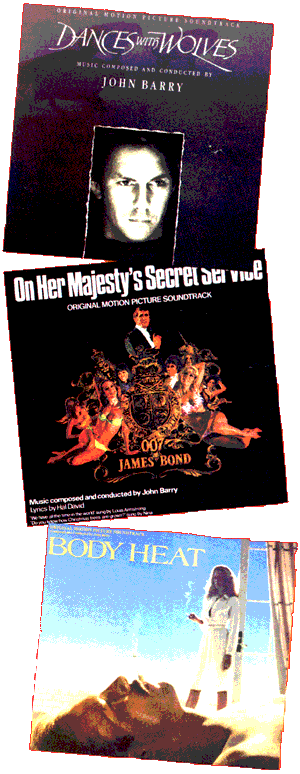

| "We started off by imitating US groups like Bill Haley and The Comets, and Freddie Bell and The Bellboys ... all the early American rock and roll groups. We'd listen to their records, take down the arrangements, and then go out and
play them!"
Although the John Barry Seven would remain a large part of his life for the next few years, it was through his musical arrangements that Barry finally got the big break that he had been waiting for. "I was always telling the people at EMI Records that I wanted to be a musical director or arranger for some of their artists, and they finally gave me Adam Faith to work with, which was an absolute gift at the time. We recorded a song called What Do You Want?, which had been written by a guy called Johnny Worth. "Well, we did the record - and I was told that I would never be allowed in a recording studio again! They said it was a dreadful record, that Adam couldn't sing, and what were we doing using pizzicato strings, when it was all Gene Vincent and Eddie Cochran type rock and roll at the time. We seemed to be totally anti-everything that the record-buying public were looking for, but about four weeks later the record was at number one!" Further hits with Adam Faith followed, while in the meantime the John Barry Seven were also beginning to make some headway, (thanks to Barry's new-found fame), with appearances on Six-Five Special, television's first teenage pop music show. It was Barry's continued success with Adam Faith that finally got him into writing for films, via the 1959 'teenflick', Beat Girl. Centred around the rebellious exploits of a respected architect's the film is now very much a museum piece, but at the time it was deemed to have its finger very much on the Pulse of current teenage trends and grievances. "That film came about because Adam Faith was very much the English 'beatnik' of the time. I wrote the score for Beat Girl, and also wrote two songs with lyricist Trevor Peacock, and was paid £200! However, it was a start. " Further success followed, on television this time, with Barry's theme Hit And Miss for the weekly pop programme Juke Box Jury, which got into the charts, while the John Barry Seven had further hits with the likes of Beat The Beatniks, Black Stocking, and Walk Don't Run. This was followed by the score for another film, Never Let Go, which again featured Adam Faith, as well as Peter Sellars in a rare dramatic role as a ruthless East End gang leader. Then, in 1962, came a call, asking Barry if he could do some work on the first James Bond film, Dr. No, and which started a controversy lasting through to the present day - who wrote what, for the film ... John Barry or the film's credited composer, Monty Norman? |
 |